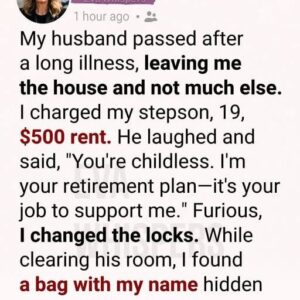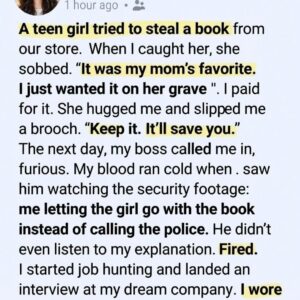I was forty-two when I married Tom—forty-six, divorced, two teenagers who made it clear I was a guest star, not a cast member. I kept to my lane: birthdays, graduations, lemon squares at Christmas, college essays with Seth at the kitchen table. I was never “family,” just… adjacent.
Brian was different. My sister’s boy, orphaned by grief early and half-raised by a father who showed up mostly in shadows. I stepped in because love tugged me forward. He called every week through college, sent postcards from cheap hostels, slept on a plastic bench during my gallbladder surgery because I shouldn’t wake up alone. He never asked for anything, and that’s exactly why I wanted to give him everything.
Tom and I built something kind and easy: a paid-off house, a pension from my years teaching, his engineer’s nest egg, a garden exploding with tomatoes we couldn’t give away fast enough. Then came the fall in the garage, the fractured hip, and Mara and Seth arriving with calculators instead of casseroles. They measured rooms and muttered about “rentals” and “nursing home costs” while their father lay in a hospital bed cracking jokes through pain. Tom called it “practical.” I called it a crack I couldn’t unsee.
I updated my will. Seventy percent to Brian, thirty to Tom. I told Tom. He nodded. “I get it,” he said—quiet, careful.
Six weeks ago, I found an envelope from his lawyer on his desk, the flap carelessly open. He’d left everything to his children. Every penny. He hadn’t mentioned it. “They’re my kids,” he said when I asked. “You have Brian. I didn’t think I needed to talk it through.” Something in me grieved a version of us that was gentler than that sentence.
I went back to my lawyer. Brian stayed my main beneficiary, but I added a condition so simple it almost felt soft: Brian must offer Mara and Seth each $25,000—if they came in person, looked him in the eye, and said one true, kind thing they remembered about me. Just one. If they refused, he kept it. If it smelled like a lie, he could say no.
Tom died two weeks later. A quiet heart attack, the kind that steals and doesn’t bother to slam a door. I held his hand until the paramedics took him away. At the funeral, Mara’s black was designer and efficient, Seth’s eulogy crisp with “work ethic” and utterly free of pancakes on Sundays or the way Tom laughed like a bark when a joke blindsided him.
Brian arrived and didn’t ask about money. We sat on the porch with tea cupped between our palms, sharing silence the way people who love each other can.
Tom’s will moved cleanly; his kids listed the house before the lilies wilted. No one asked if I wanted the spider plant from the bathroom window or a photo from the hallway. When my lawyer called them about my estate, they moved fast. Then they hit the condition.
Mara called first. “Are you serious?” she snapped. “What kind of twisted game is this?”
“It’s not a game,” I said. “It’s one sentence.”
“To Brian? He’s not even family.”
“I wasn’t yours either,” I said softly.
She hung up.
Seth texted Brian—Can we talk?—then slouched into a diner booth across from him and said, arms crossed, “I don’t remember her that well. She didn’t raise us.”
Brian stirred his coffee. “Then I guess this money isn’t for you.” Seth left, offended by the price of a memory.
I thought that was the end of it until three weeks later, Mara knocked on my door. No audience. No performance. Just a woman who looked smaller than her shoes.
“Can I come in?” she asked.
We sat in my living room, the one she’d treated like a hallway for years.
“I was mean to you,” she said, eyes on her hands. “You weren’t Mom, and I punished you for existing. But you were there. At my graduation. At that horrible Thanksgiving after I lost my job—you brought pie and said nothing, just watched movies with me. I never told you I noticed.” She swallowed. “I did.”
She pressed an envelope into my hand. “I don’t want the money. I just wanted to say that.” Then she left before I could decide whether to cry.
Brian donated $25,000 in her name to the women’s shelter in town. She never knew. Seth never came back.
Life settled. I joined a book club where people argue kindly about commas. Tulips went in by the mailbox. Brian moved twenty minutes away and opened a small art café he called Rosie’s, after my sister. Her paintings hang on the brick walls like windows to a different sky.
Over an iced lavender something I would have mocked ten years ago, Brian asked, “Why the condition?”
“Because money’s easy,” I said. “Words cost. Especially the true ones we don’t say until it’s too late.”
That’s the legacy I wanted: not the dollars, but the nudge. To reach past grievance, to test if there was anything warm left under the armor. Tom made his choice. His kids made theirs. I made mine: give the bulk to the person who shows up without being summoned. Leave a door cracked for someone brave enough to step through it with a single honest sentence.
Some people live with their eyes closed. That’s their journey. Mine feels lighter now—not from what I kept, but from what I watched soften in time.
If you’re wondering who your real family is, look for the ones who show up on hard Tuesdays, who ask about your stories, who hold your hand during bad news and good tea. And if you’ve got even one, tell them. While you still can.




